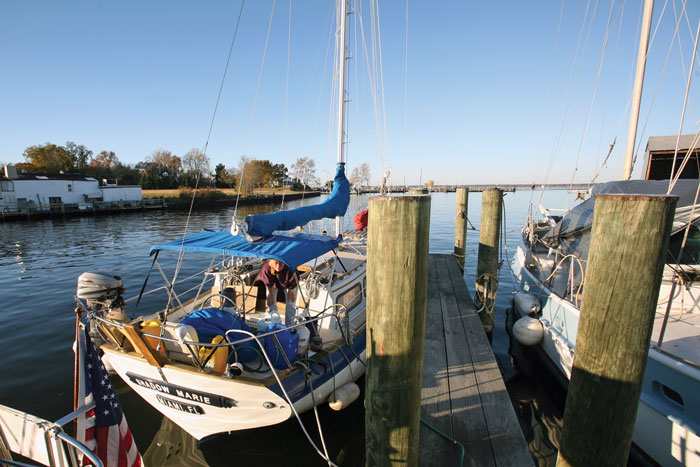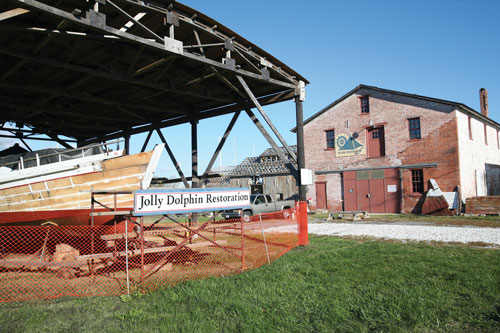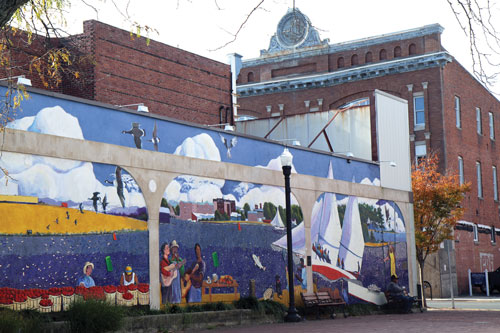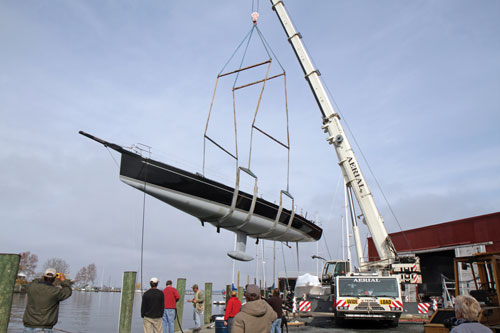Mitch has been kind enough to let us republish a recent series of articles he wrote that are at the Observer News. I have included a link back to the original article on the Observer News website at the bottom of the article here.

My wife Michelle flew in to help prepare the boat for the voyage home. The tanks and lockers are full. It is time to sail home. Saying goodbye to Michelle was the hardest part.
Part two of an Observer News feature series
The Chesapeake Bay is beautiful, historic and the entire area is a national treasure. Part of what futurists Herman Kahn and Anthony Wiener termed the BosWash Corridor; 50 million people, nearly 20 percent of the population, live in the region stretching from Washington, D.C. to Boston, on only two percent of the U.S. land area. The Chesapeake Bay, particularly the Eastern Shore, is a respite from the crowding. The bay plays a prominent role in our nation’s birth and history. While the Founding Fathers created the concepts in Philadelphia, much of the blood was shed for freedom on these waters.
For a boater, the bay appears to be nirvana. There are hundreds of rivers and creeks offering protection from adverse weather. There are also hundreds of historic, picturesque waterfront communities to visit. Years could be spent cruising here without seeing it all. But the Chesapeake is also temperamental and, in fact, can quickly become downright grumpy.
Last year I sailed for the Chesapeake from Cape Cod, through New York City, then sailing offshore in the Atlantic to Cape May, New Jersey. From there I sailed up the Delaware Bay to the C&D Canal, which brought me to the bay. The stark, desolate landscape and the steel gray water of the Delaware instantly changed to calm, blue water with beautifully wooded shorelines upon arriving in the Chesapeake. On my first day in the bay, I had an idyllic sail to the Sassafras River where I anchored not far from a small town.
By evening, things had changed rapidly. The National Weather Service issued storm warnings for my area as the sky turned from blue to a bruised-looking black and blue. As I went forward on the deck to ensure the sails were secured for rough weather, I looked up and saw a wall of white approaching me. It appeared as though the water in the river was being sucked up into the sky. I paused only for a moment to marvel at that strange and frightening phenomenon and then tore back into the relative safety of the cabin. Within 30 seconds the wall struck, laying my 18,000-pound boat nearly on its side. Looking out through the portholes, I was alarmed to see that the riverbank was gone and I could see nothing but white. I had no idea if my anchor was holding or dragging and there was nothing I could do about it if it were the latter. It was the first time in my 30 years of boating that I feared I could actually lose my boat.
Although it felt much longer, the wind passed within a minute or two. Outside, the boat was a shambles with full, heavy jugs of water and fuel tossed across the cockpit, a clear plastic windshield destroyed and the American Flag that proudly flew from the stern on a heavy teak pole lost to the wind and rain. The radio reported sightings of tornados that downed trees and cut electrical power to more than 50,000 homes in the area. I don’t know if it was a tornado that I saw approaching me but I do know that I never want to experience something like that again. I also learned that the calm, beautiful demeanor of the Chesapeake Bay is sometimes an illusion.
I returned to the Chesapeake last week to prepare the boat for the final leg of my voyage south to Florida. The wind was blowing hard and small craft advisories had been in effect on the bay for nearly a week. As the wind continued to blow, my planned launch date came and went. I had no desire to tempt fate, knowing all too well that the bay can be terrifying in a small boat.
There are certainly worse places to be weathered in. Cambridge, Maryland, is a friendly community on the Choptank River. Founded nearly a century before the Declaration of Independence was written, it is a bustling city with traffic and development that seems to defy its relatively small population. During the age of sail, it was the second largest port in Maryland and today a city park that greets visitors coming from the Baltimore / Washington area is centered upon a large artistic rendition of a sail. Along the waterfront, boat builders restore skipjacks and other historic boats to their former glory and the well-managed city-owned marina is surrounded by parks and historic homes. The housing economy appears diverse with immaculately kept mansions from yesteryear, neglected mansions from the same era, decrepit row houses and brand new condominiums all lining the waterfront.

Mitch Traphagen photos Historic boats are lovingly restored by hand at boatworks along the Cambridge, Maryland, waterfront. Once the second largest port in Maryland, Cambridge now primarily serves yachts of all sizes.
The diversity is also reflected in the notable residents that hailed from Cambridge. It was the home of Harriet Tubman, an escaped slave and activist on the Underground Railroad. A century later, Tubman’s spirit returned through Gloria Richardson, a civil rights leader who made Cambridge the center of the civil rights movement in 1962. The Cambridge Nonviolence Action Committee targeted desegregation in schools and public buildings along with other social injustices. Racial strife in the city reached a point to which the National Guard was called in — and it remained for more than a year. The “Treaty of Cambridge,” negotiated by the U.S. Justice Department and Robert F. Kennedy, began the road to recovery in 1963. Today, while it would be naive to think it doesn’t exist, there is no evidence of racial strife in this community.

Cambridge was also home to Beatrice Arthur, the actress of the television shows Maude and The Golden Girls. While attending Cambridge High School, she was named “Wittiest Girl.” And with due reflection of the diversity of the community, the city is the birthplace of Stephen Allen Benson, who in 1856 became the second president of Liberia.
Just down the bay from Cambridge, Tangier Island was the British staging point for the assault on Baltimore in the War of 1812. That battle provided Francis Scott Key with the inspiration to write what would become the National Anthem. Further south is Norfolk, the last stop on the bay before entering the Intracoastal Waterway. Norfolk is home to the world’s largest naval base and is replete with American history from the Revolutionary War to World War II.
The winds have calmed on the Eastern Shore of the Chesapeake Bay but a cold front is barreling across the nation, dumping heavy snow on the northern plains. The National Weather Service is predicting it will lose steam as it approaches the Chesapeake region but I know better and will therefore plan for the worst. It is time to sail out of Cambridge and the Chesapeake Bay for the relatively protected confines of the ICW through Virginia and the Carolinas.

It turns out I won’t be the last boat out of the Chesapeake bound for Florida: a 70-foot racing sailboat is shown being launched at Cambridge Yacht Maintenance, just down the dock from my boat. Despite leaving after me, at roughly three times my speed, they will arrive in Florida long before I do.
But right now the weather is beautiful. My wife Michelle flew in to help prepare the boat for the long cruise and we spent two days running around town, filling tanks and lockers on the boat. Beneath the frantic activity was teamwork, laughter, and the sharing of a mutual dream; the life we first lived and loved upon moving to Florida 15 years ago. Tomorrow I will have to watch her slowly recede, waving the entire time, as I motor out of the harbor and the frenzied camaraderie of the past two days will be replaced with acute loneliness. For hours, or perhaps days, the laughter we shared will echo in the quiet of the empty cabin. Then slowly, in the emptiness, comes the resolve to get home. The weather is saying go and tomorrow I will have to say goodbye.
http://www.theobservernews.com/news/front-page-news/625-saying-goodbye.html

Recent Comments